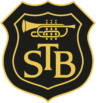OUR HISTORY
Villages such as Brailes, Ilmington and Halford supported a band and were indeed often engaged to perform in Shipston-on-Stour for carnivals and fetes, so there was obviously a groundswell of opinion in the town that Shipston-on-Stour too ought to have a band.
The Stratford Herald in March 1912 reports that a committee had been formed to begin raising funds to enable a band to be formed. Around the same time William Holman, a former military bandmaster, moved into the town and during a conversation with Frank Parsons (a local auctioneer and something of a wag), accepted a bet that in the space of six weeks he could train a band from scratch fit to march through the streets of Shipston-on-Stour.
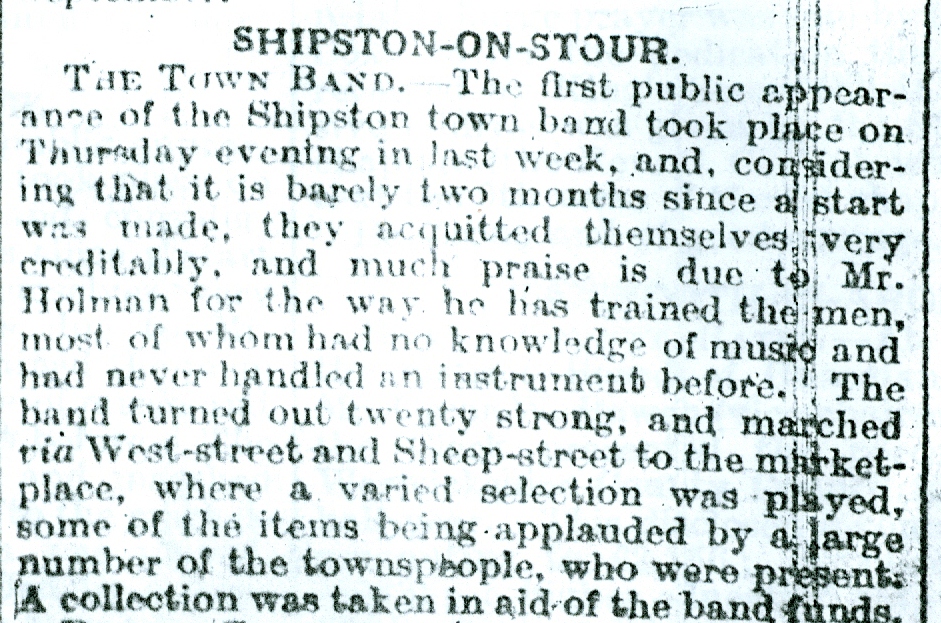
Six weeks passed by and on Thursday, 16th May, 1912, Shipston Town Band gave its first public performance. Using an ingenious system of numbers, William Holman had managed to teach his raw recruits a march and a waltz. The band lined up nineteen strong and marched up West Street, along Darlingscott Road and down Sheep Street returning to the Square, pausing on-route to play their waltz on each street corner. This, so the story goes, proved too much for most of these inexperienced bandsmen and by the time the band had returned to the square only William Holman and the drummer were still playing. Nevertheless, William Holman was adjudged to have won his bet and the band has been in existence ever since.
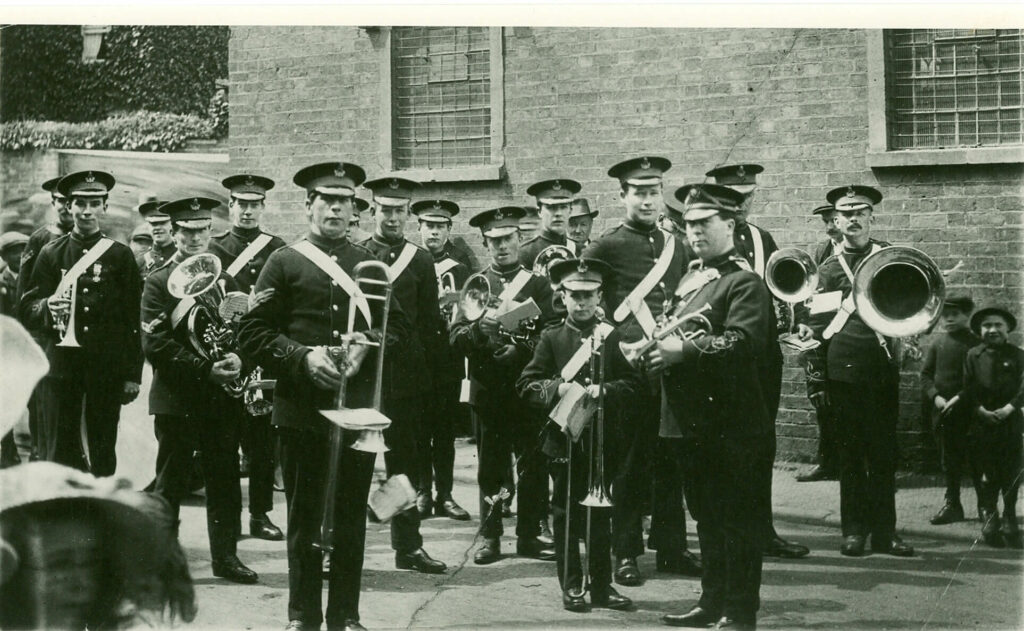
The Great War
Soon after its formation came the outbreak of the Great War. This obviously had an effect on the band with a number of its players being called up for active service. However, it was decided to carry on despite these problems and the Band Committee elected to pay the subscriptions of those players who had enlisted whilst they were away serving King & Country. When William Holman was called to service as a Regimental Bandmaster, the position of conductor was taken over by J. R. “Dick” Mayo who owned the local timber yard and was to prove a very influential person in the history of the band during the next two decades. The band contributed quite considerably to the war effort by performing at recruiting rallies, concerts for the troops and by marching the troops off to war when the local volunteers marched off to the station en-route to France.
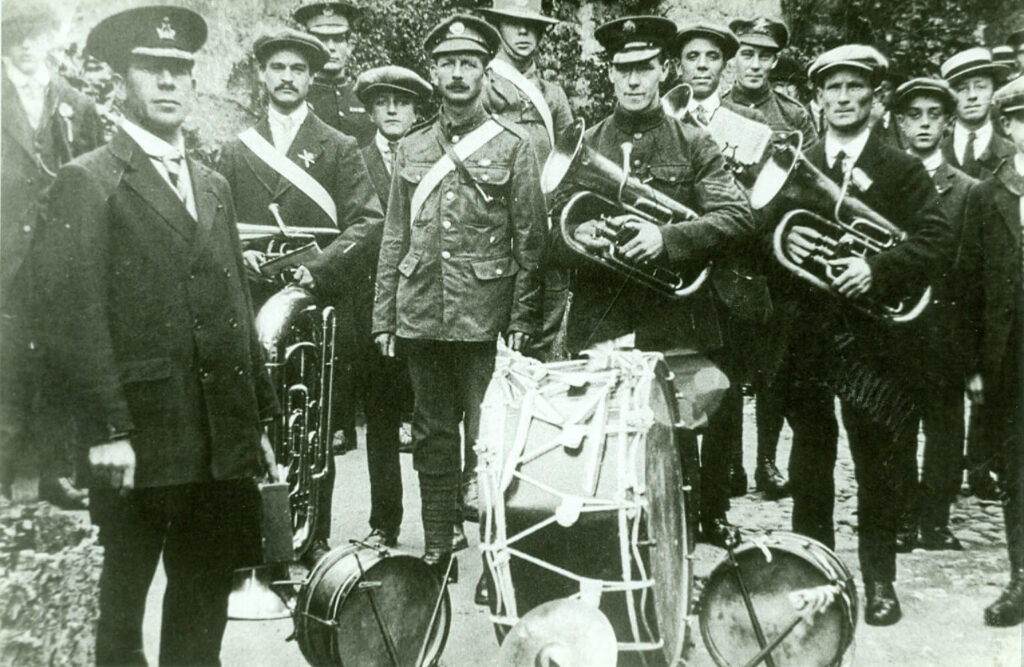
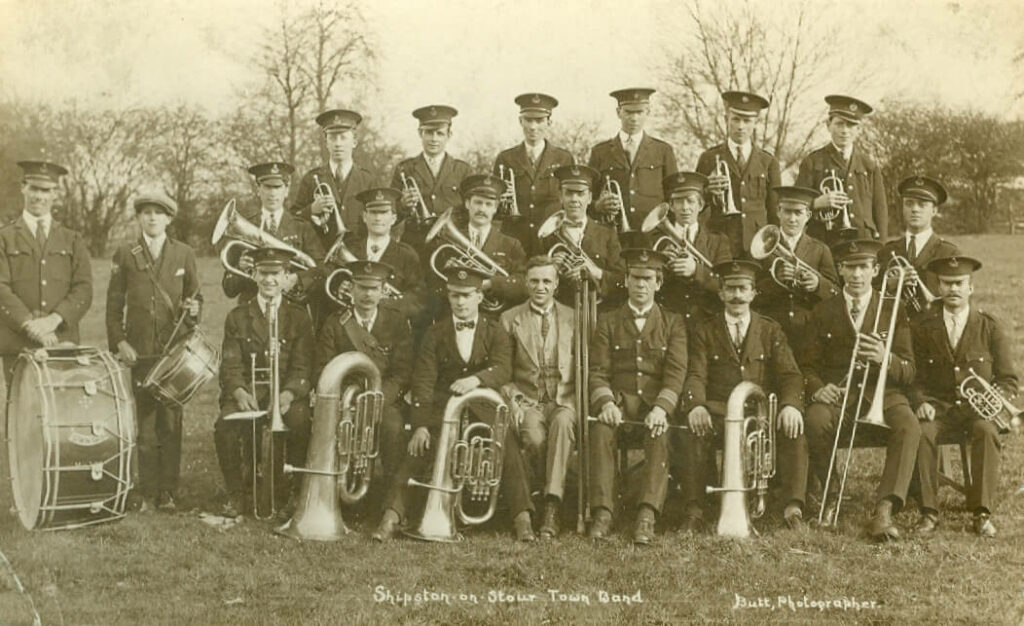
Between World War I and II
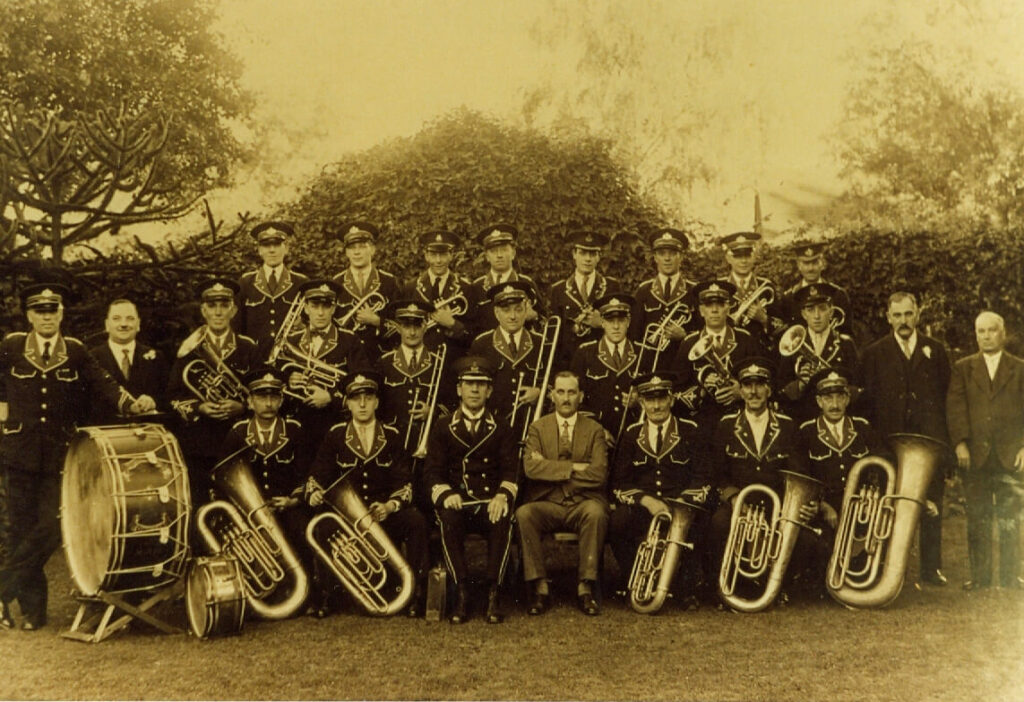
In the period between the wars, the band served the town well under the able leadership of J. R. Mayo. Many local engagements, fetes, carnivals and the like were undertaken and under Mr. Mayo’s leadership the band went from strength to strength, at a time when many other local bands were closing down as the developments in transport presented people with many alternative hobbies.
he band, which had over the years practised in the back rooms of a number of local pubs and hostelries, became the proud possessor of its own band hall a metal hut used during the great war to billet the Durham Light Infantry and this was to remain in use until 1968. In the band at that time was young cornet player B. J. “Bert” Smith who in turn was to prove a very influential and important person in the history of the band.
After World War II
The Second World War caused the band to close down temporarily and all the instruments were put in store. Once the war was over and the servicemen had been demobbed, the band was reformed under the leadership of B. J. “Bert” Smith. The first engagement for the band was the Charity Cup Final. The instruments were taken out of store. Players gathered together and the band marched off. Most of the instruments had coped well with the period in store however the cymbals proved a little the worse for wear and as the band was marching along, the leather thongs disintegrated and the other members of the band saw them bouncing down the hill as their player Mike Newman from Paxford was left grasping thin air.
1950s & 1960s
Before the war, a number of players from Shipston-on-Stour had travelled to Chipping Campden to play at contests as members of the Chipping Campden Band as Shipston Town Band were not interested in competing. In 1956 however, Shipston Band decided to take the plunge and entered its first contest. The venue was Winchcombe and the band played the march ‘The Middy’ by Kenneth Alford and the selection ‘Black Prince’ by J. Greenwood. Although not a winning debut, this sparked off a considerable amount of interest and in the succeeding years, many other contests were entered. “Bert” Smith remained conductor of the band until his death in 1976 and achieved countless successes with the band including qualifying for the National Finals in London in 1961 and 1971. 1961 was perhaps his most successful year when the band gained some 20 trophies. Bert’s son John still plays cornet with the current town band.
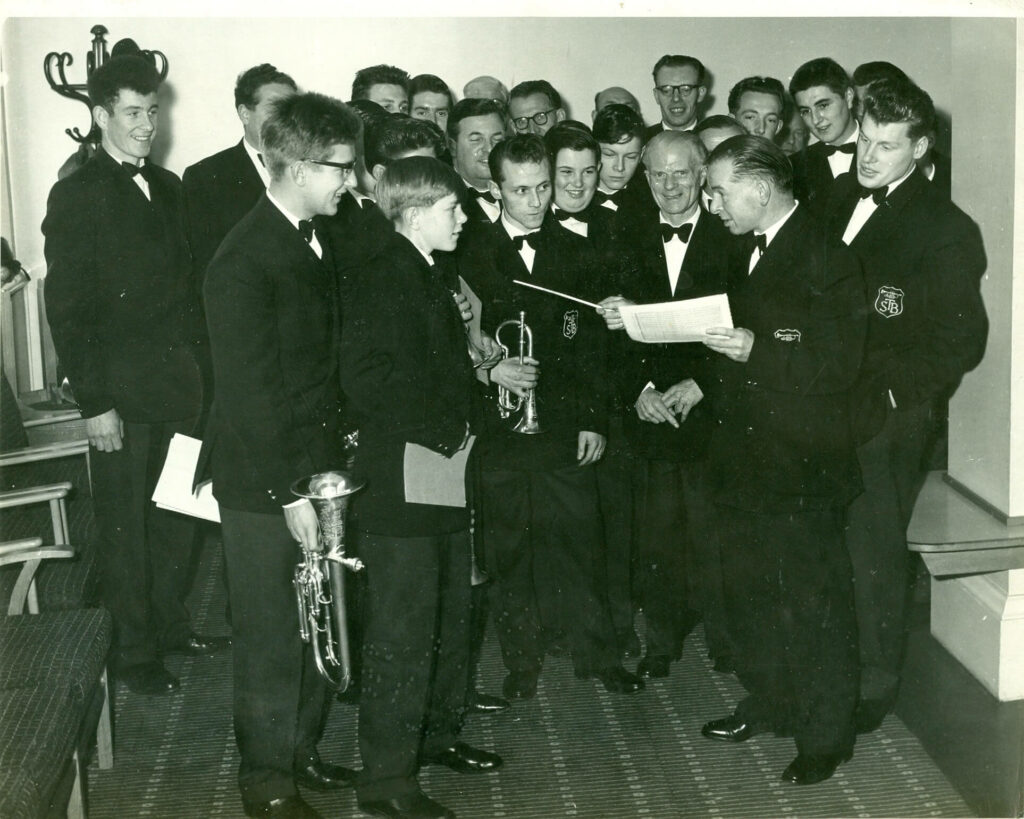
1970s
After Bert’s death in 1976, the band was fortunate to obtain the services of Richard Nash from Rhymney in South Wales as its conductor. A conductor of renown, Richard was able to impart his immense experience to the band and under his direction the band reached new heights qualifying for the National Finals and the Final of the Radio Birmingham Knockout Competition for Bands and winning promotion from the Fourth Section to the second section in National Band Gradings. He introduced the band to the Rhymney Silurian Choir with whom the band performed many enjoyable concerts both in Shipston-on-Stour and in Rhymney itself. This relationship was renewed one summer when the choir helped the band celebrate its centenary by performing with them at Shipston Proms on Saturday, 23rd June 2012.
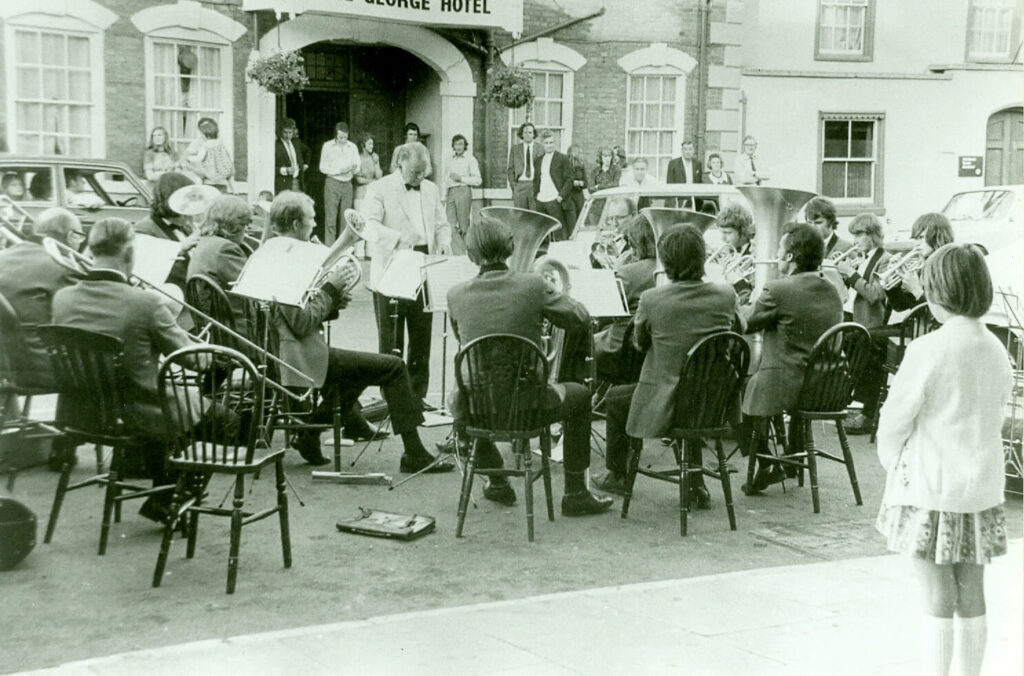
1980s
After the retirement of Richard Nash and his bandmaster and assistant Peter Stevens, the band passed into the hands of Charlie Cox who was able to bring all his years of experience of playing and conducting with the Royal Welsh Fusiliers to the band.
Charlie brought a fresh feel to the band, whilst guiding and training the band as his predecessors, he introduced many of his own arrangements of music from the shows which did and still do feature predominently in the bands repertoire. Starting with a piece called simple ‘Cowboys’ which drew together several well known western themes, the band soon found it had gained quite a tour de force in Charlie as many other fine arrangements flowed from his pen. ‘Me and My Girl’ and so many more which delighted and entertained both bands people and audiences alike. Not content with this Charlie embarked on his stage career as he often performed ‘The Road To Mandalay’ and lead numerous annual community singing sessions at annual Christmas concerts.
With his distinctive Welsh twang, his energy seemed boundless as he returned to the cornet rank and then decided to return to his saxophone and give banding a rest – not for long, the band was delighted to see him back in harness doing the odd spell of conducting and working tirelessly on the band committee to become Chairman/Secretary until his retirement.

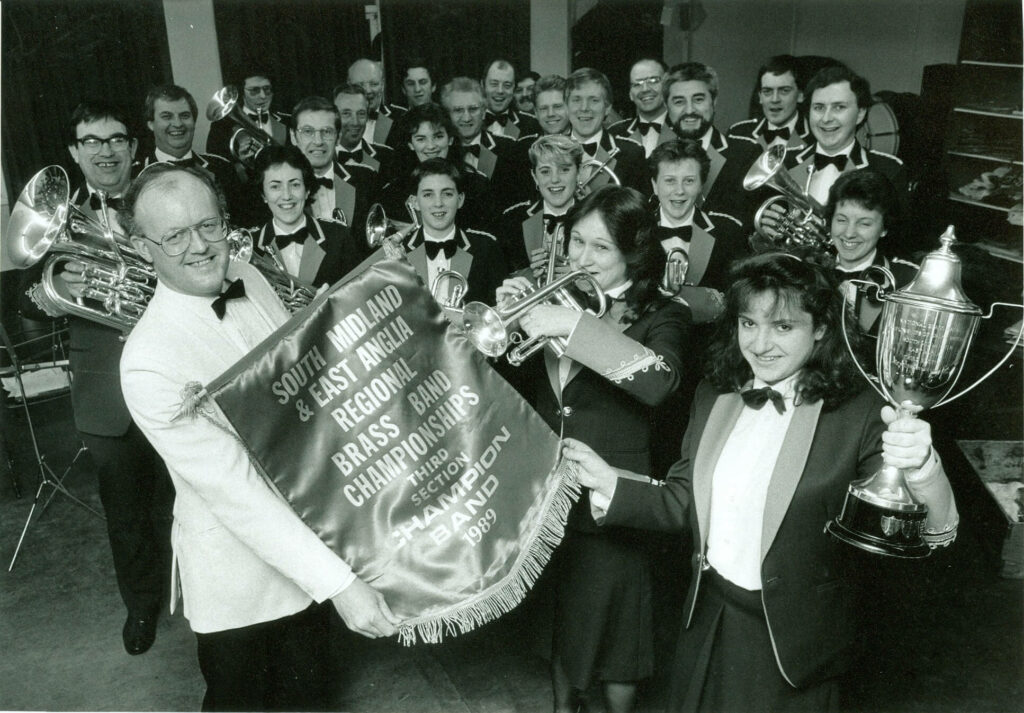
When Charlie opted to return to playing, the band were able to enlist the help of David Williams whose experience with some of the very best bands in the country saw us emerge as Midland Regional Champions in 1989 and qualify for the National Finals London in successive years. David came to the Band with an relentless enthusiasm and energy which had a contagious effect on the Band. With a bright new star rising in the cornet ranks – Ms. Kirsty Abbotts of course – Shipston were on course for a new run of success as David honed the band to make Shipston to be a band to once again be reckoned with on the contest circuit. Stretching the Band once again as one of his predecessors Richard Nash had done, David soon had the them performing pieces the band would have once possibly shied away from, David would accept nothing but each players best and them some . . . the results were self-evident in a short time as musicians and audiences alike noticed something fresh about Shipston Town Band.
Over the years the band has been conducted by many quite distinguished conductors, here are just a few more who have contributed to make Shipston Town Bands what they are today . . .
Jeremy Dibb, M.A.,Bmus, A.R.C.M., P.G.C.E.
Educated at Manchester University & The Royal College Of Music, Jeremy has been involved in music education since 1985. He has regularly advised on the delivery of the music curriculum for primary schools, run singing workshops, directed training sessions for teachers and conducts choral concerts for young singers of all ages. Jeremy has composed hundreds of songs for class use and choir work, many of which he has used on a regular basis in his own teaching. Chair of Trustees – Warwick Choristers, Freelance education consultant to Warwick Schools Foundation.
Dennis Grant
Joined us in 2002 and conducted us for two years until 2004 and had to stand-down owing to a change of employment. For many years the Principal Cornet with the Flowers Band from Gloucester, as they developed into one of the country’s top Championship bands. Conducting extensively in the Gloucester Area and has previously been the conductor of Avonbank, Malvern Hills and Thornbury. He first joined to conduct Shipston at the Midland Regional Contest at Burton-upon-Trent in 2003.
Dave Lea
Born into a Salvationist family, was introduced to brass banding at early age of five when he began to learn the cornet. Many years were spent in S.A. banding, culminating in a period of fifteen years as principal cornet of the Coventry City S.A. Band. During this period he attained a Diploma for Trumpet Playing at the London College of Music and took an active interest in conducting brass and choral groups.
Dennis Abbotts
A local player from nearby by Brailes Band, who joined Shipston in 1964 which began a long relationship between the Band and Dennis. His talents were many and he became a proficient player on baritone, trombone and Eb bass. For many years he conducted and ran the Band’s Junior Section, but was always ready to take up the baton in the main band when required. Throughout the years many of the Band’s instrumentalists took their first brass playing steps courtesy of this tireless and enthusiastic local musician and no roll of Shipston Band conductors would be complete without Dennis Abbotts.
Glenn Coleman
A former professional trumpet player from the Welsh National Opera, had a daughter, Mellisa, who having left the Stratford-upon-Avon Youth Military Band and joined Shipston Brass Band, she had often said my dad would love to conduct Shipston and so with a little persuasion he did and soon began another association as Glen brought his many talents and passion for brass playing to the Band.
Les Yarrow
An experienced and accomplished Euphonium player from the Ever Ready Band from County Durham, and took the band for a short while, bringing his own personal style and interpretation to the Band’s playing. He worked tirelessly to improve the Band’s overall sound and train the the players to become a quality brass instrumentalists drawing on his own experiences when Every Ready dominated the northern bands in their bright scarlet tunics.
Howard Gibbs
An experienced conductor and musician, who has also conducted West Mercia Police, Moulton ’77 and Newtown Bands. He achieved some notable contest successes with Shipston Town Band winning the Oxford Association Entertainment Contest in 2008 Wychavon Contest in September 2009 and becoming Midland Area Fourth Section Champions in 2010.
David Birch
An experienced and highly competent euphonium player. David has spent many years working with, encouraging and training the Band’s many future players and took on Dennis’s mantle to run and conduct the Junior Band after his death. When he’s not playing euphonium with the Town Band he can be found conducting Stour Concert Brass, Shipston’s highly successfull non-contesting concert band, which provides an outlet players of all ages and abilities.
